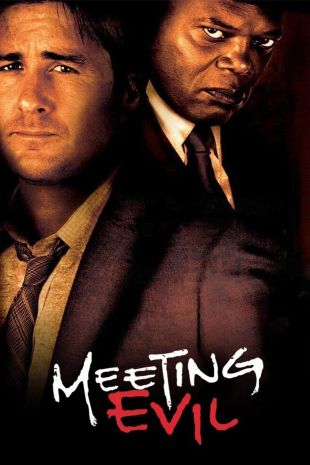
One of the more common tropes in crime fiction, either on the page or on the screen, is the hero's realization that he has more in common with the villain than he'd like to admit. Director and screenwriter Chris Fisher has created a dark variation on this theme in his thriller Meeting Evil, in which a seemingly ordinary man becomes an unwitting participant in a bloody crime spree by a maniac who appears to personify the violent id to the family man's rational superego. The film is anchored by a strong performance from Samuel L. Jackson and a fine supporting turn by Luke Wilson, but after a certain point it seems afraid of its own premise, and the movie doesn't pay off on the promise of the first act.
In Meeting Evil, John (Luke Wilson) finds his life in the midst of a long slide to the bottom, thanks to his job as a real-estate salesman in a market flooded with foreclosed homes. His bank account is dwindling, his bills are past due, he's fumbled a big sale, and after he's ultimately fired from his job, he comes home to find a notice on his own front door declaring that the bank will be taking his house. After a curt conversation with his wife Joanie (Leslie Bibb), she leaves with their two kids for a long walk, and John is left alone with his troubled thoughts until there's a knock at the door. A gregarious stranger who calls himself Richie (Samuel L. Jackson) says he's having trouble with his car and needs some help. John is wary, but agrees to give the car a push. Richie's vintage muscle car backfires, burning John's leg, and Richie insists on taking John to the hospital.

However, Richie also wants to make some stops along the way, first at a gas station and then at a bar. While people who lack courtesy and generosity try John's patience, these faults fill Richie with an intense rage, and when John isn't looking, Richie deals with his feelings by leaving dead bodies in his wake. After John's former co-worker (and ex-mistress) Tammy (Peyton List) is taken along for the wild ride, John discovers he's dealing with a very dangerous lunatic, and he needs to escape if he wants to save himself. But even after John flees, he realizes he's unintentionally welcomed Richie into his home, and he must protect his wife and children against the coming invasion. Meanwhile, the police have found the trail of victims, but detective Frank (Muse Watson) and his partner Latisha (Tracie Thoms) are convinced John is the culprit, and they're suspicious when John tells them about the dangerous stranger.
Samuel L. Jackson is a master at playing characters who are charming but carry a palpable air of menace, and he's very good in the first half of Meeting Evil, making Richie just charismatic enough that you want to stick with him, while making it clear there's something a little too aggressive about his demeanor. Jackson carefully modulates his behavior until John realizes Richie is a murderer, at which point he begins pushing a bit too hard, although he still gives the best performance in the film. Luke Wilson isn't as showy or compelling as John, but he plays off Jackson well, allowing his subtle gestures and expressions to convey John's growing anxiety and increasing suspicions about Richie and himself. Jackson and Wilson are good enough that it's a shame most of the supporting cast regularly miss their targets, overplaying badly and showing their cards too easily, especially Leslie Bibb as John's overbearing wife and Muse Watson as a police detective who seems to think "colorful" and "obnoxious" are the same thing. Director and screenwriter Chris Fisher has the same problem as his leading men, handling the story well until the full measure of Richie's madness becomes clear. From that point on, Meeting Evil's blend of psychological thriller and police procedural starts to sour. It doesn't help that Fisher seems to infer that Richie is not just a man but also some sort of malevolent supernatural being, but he never lets this notion fully surface or play itself out. (Meeting Evil was adapted from a novel by Thomas Berger; in the book, Richie is an escaped mental patient, but that's been abandoned in the film version). When it works, Meeting Evil generates an impressive level of uncomfortable tension, but the movie drops the ball long before the final showdown, and what starts as a smart and offbeat thriller loses its credibility and its ability to generate suspense without ever fully exploring its premise.
